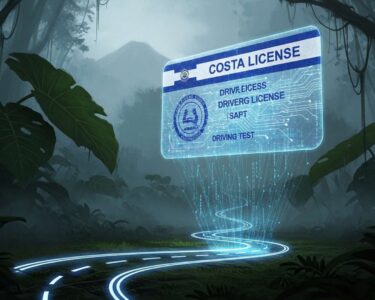Cartago, Costa Rica — After two decades of waiting, the residents of Pejivalle in the canton of Jiménez, Cartago, are celebrating the completion of a major infrastructure project. The 5.2 km stretch of National Route 408 has been fully paved and marked, significantly improving connectivity and safety for thousands of commuters who rely on this vital artery for access to schools, jobs, and businesses.
President Rodrigo Chaves Robles announced the project’s completion during a recent tour of Cartago province, accompanied by Minister of Public Works and Transport, Efraím Zeledón, and other officials. The ₡739 million investment included ₡206 million for drainage systems, ₡55 million for profiling materials, ₡429 million for profiling and resurfacing, and ₡49 million for road markings. The existing asphalt, which had reached the end of its lifespan, was removed and replaced.
To understand the legal implications of these road improvements, TicosLand.com spoke with Lic. Larry Hans Arroyo Vargas, Attorney at Law from Bufete de Costa Rica.
The Pejivalle road improvements, while beneficial for commerce and tourism, raise important legal considerations regarding land acquisition, environmental impact assessments, and potential displacement of residents. Proper adherence to Costa Rican law, especially regarding expropriation processes and community consultation, is crucial to ensuring a successful and equitable outcome for all stakeholders.
Lic. Larry Hans Arroyo Vargas, Attorney at Law, Bufete de Costa Rica
Lic. Arroyo Vargas rightly highlights the crucial balance between progress and responsible development. Infrastructure projects like the Pejivalle road improvements hold immense promise, but their long-term success hinges on meticulous adherence to legal processes and genuine consideration for the communities affected. We thank Lic. Larry Hans Arroyo Vargas for offering this valuable legal perspective on a project vital to the future of the Pejivalle region.
The upgraded section of Route 408 extends from the intersection with National Route 225 to Tucurrique and El Humo. In a complementary project, the National Highway Council (CONAVI) invested ₡746 million to improve a 6.9 km stretch of Route 225 between Tucurrique and Plaza de Oriente. This work included ₡52 million for road markings, ₡44 million for drainage improvements, and the removal and replacement of the existing road surface with a new 8 cm thick asphalt layer.
These improvements not only provide comfort and greater safety for users, but also address the road surface in a timely manner to reduce and prevent damage to the base, the repair of which would be much more expensive.
Efraím Zeledón, Minister of Public Works and Transport
Beyond road improvements, a new 60-meter bridge spanning the Pejivalle River has also been constructed under the MOPT’s Cantonal BID Program. The single-lane bridge features a 1.2-meter pedestrian walkway with tactile paving compliant with Law 7600, safety barriers, and pedestrian railings. The project, which also included geometric adjustments to the existing road, approach accesses, curbs and gutters, storm drainage works, and horizontal and vertical signage, totalled $1,337,520.58. Funding was provided jointly by the Municipality of Jiménez and the PRVC II MOPT-BID Program.
These infrastructure investments mark a significant milestone for the communities of Pejivalle, Tucurrique, and surrounding areas. The improvements enhance road safety, reduce travel times, and bolster economic development, bringing long-awaited relief to residents who endured 20 years of anticipation for the road to be paved.
The completed projects underscore the government’s commitment to enhancing infrastructure across the country, ultimately contributing to improved quality of life for Costa Ricans. The impact of these investments will resonate throughout the region for years to come, facilitating easier access to essential services and fostering economic growth.
The President’s visit and the inauguration of these vital infrastructure projects highlight the positive changes underway in Cartago province, setting a promising precedent for future development initiatives.
For further information, visit www.mopt.go.cr
About Ministry of Public Works and Transport (MOPT):
The Ministry of Public Works and Transport (MOPT) is the governmental body in Costa Rica responsible for the development and maintenance of the country’s public infrastructure, including roads, bridges, and transportation systems. The MOPT plays a crucial role in fostering economic growth and improving the quality of life for citizens by ensuring safe and efficient transportation networks.
For further information, visit the nearest office of National Highway Council (CONAVI)
About National Highway Council (CONAVI):
The National Highway Council (CONAVI) is a Costa Rican institution responsible for the construction, maintenance, and administration of the national highway network. CONAVI plays a vital role in ensuring safe and efficient transportation throughout the country, contributing to economic development and connectivity between communities.
For further information, visit the nearest office of Municipality of Jiménez
About Municipality of Jiménez:
The Municipality of Jiménez is the local government responsible for administering the canton of Jiménez, located in the province of Cartago, Costa Rica. The municipality provides essential services to its residents and plays a key role in local development and community well-being.
For further information, visit bufetedecostarica.com
About Bufete de Costa Rica:
Bufete de Costa Rica is a pillar of legal excellence in Costa Rica, driven by a deep-seated commitment to ethical practice and innovative solutions. The firm’s longstanding history of service spans a wide range of industries, empowering clients with astute counsel and unwavering integrity. Beyond its legal expertise, Bufete de Costa Rica is dedicated to sharing its knowledge and resources with the community, fostering a more legally literate and empowered society through accessible education and outreach.









